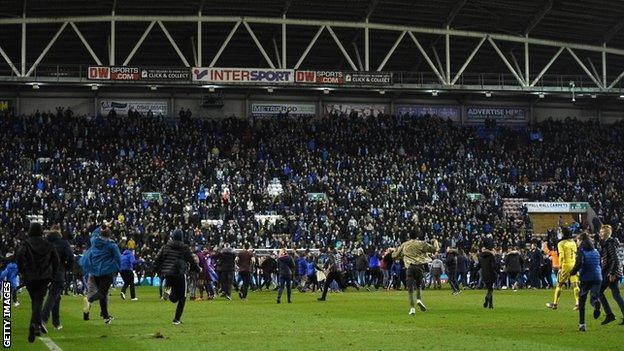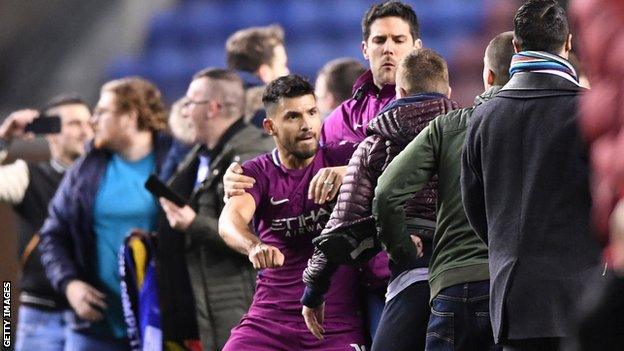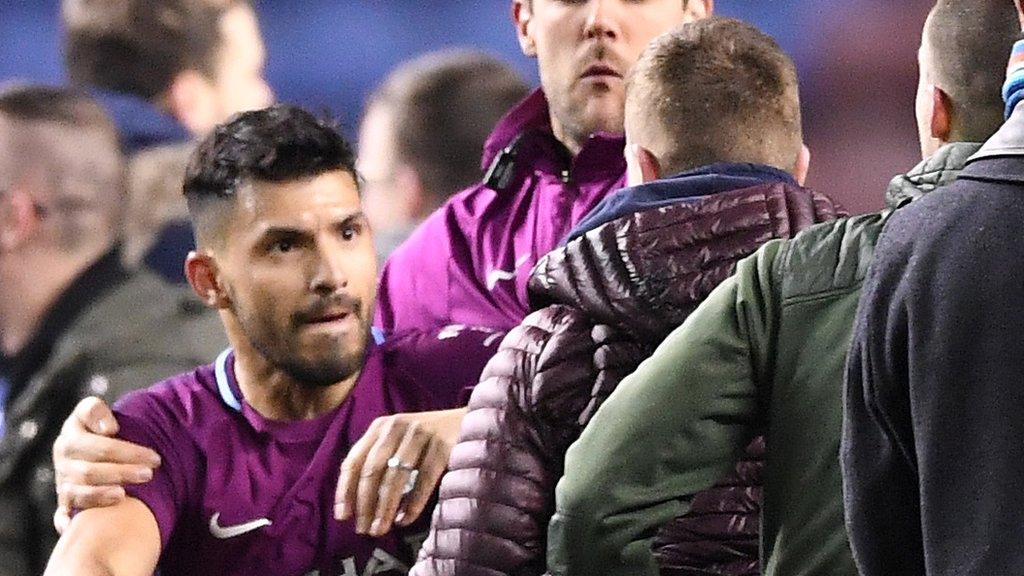Football violence: National police lead for football warns disorder will continue to rise at grounds
- Published

Wigan say they will work with the FA following crowd trouble during their FA Cup fifth-round tie
Violence and disorder at English football grounds may increase further unless clubs cover policing costs, the sport's police chief has warned.
Mark Roberts, a deputy chief constable with South Yorkshire Police, says the game will not be a "highly marketable product" if incidents continue.
He was responding to the pitch invasion after Wigan's FA Cup victory over Manchester City on Monday.
"Sadly, unless something changes, we're likely to see more incidents," he said.
Speaking to BBC Sport, the police lead for England and Wales said there was "a bad combination of clubs getting richer but cutting costs".
Police figures show an upward trend for reported incidents including pitch encroachments, assaults on staff and the use of fireworks.
"We have fewer police officers in football grounds; clubs are cutting costs for policing and backfilling with stewards who don't have the same authority as the police," said Roberts.
"Just when football is about to secure another multi-billion-pound TV deal, there is a bad combination of clubs getting richer but cutting costs and police forces cannot subsidise football."
The Premier League said it would like to "see the authorities take crowd-related incidents more seriously".
Government figures, external show a rise in arrests for pitch invasions last year, but a fall in overall arrests and a drop in the number of football banning orders being issued.
However, separate figures compiled by police forces for the top five leagues in England, and given to the BBC, show incidents of disorder are on the rise both inside and outside football grounds.
Since the 2012-13 season, reported incidents inside stadiums have increased from 427 to 853.
Reported attacks on stadium staff are up from 112 to 154, and pitch encroachment from 160 to 265.
The Premier League responded to Roberts' concerns by stating there had been a "dramatic fall" in crowd disorder at football over the past 30 years.
"While we share the police's concerns at the slight increase in matchday incidents recorded so far this season, we are working with those police forces to eradicate this from Premier League matches," the statement said.
"In general, the reduction in police presence inside Premier League stadiums has been at the request of police forces themselves, who are keen to see stewards take more responsibility in the stands.
"The Premier League and its clubs would like to see the authorities take crowd-related incidents more seriously. Clubs have themselves issued bans to individuals when the authorities have decided not to pursue any charges."
The EFL said that "over 50%" of games have no direct police presence - part of a growing trend in the lower divisions.
A statement read: "With arrests currently at a rate of just four per 100,000 spectators, the decreasing demand for policing in stadiums is being made possible by the commitment and investment made by the EFL and EFL clubs to ensuring matchday staff are as well trained as they can possibly be.
"However, the EFL will never be complacent in this area and is, of course, concerned about the potential for disorder inside our stadiums. Where clubs are required to pay for policing services, they do so in line with their legal obligations."
Roberts says police resources are stretched to the limit, and they cannot provide the numbers of officers as in previous seasons.
"We can only recover a third of what it costs us to police football," he said.

Sergio Aguero will not face action following the altercation with a fan at Wigan
After League One Wigan beat Premier League leaders Manchester City at the DW Stadium on Monday, many home fans ran on to the pitch.
City striker Sergio Aguero had an altercation with one fan, later saying he was spat at and sworn at.
Fans in the away end were seen ripping out advertising hoardings and throwing them towards police.
Wigan chairman David Sharpe said the club would work with the Football Association and police to review the disorder.
"Clubs are responsible for the safety of the people in the ground but we will always work with them, Roberts said.
The Premier League says "clubs and the police engage with local safety advisory groups to agree on measures to maintain high levels of safety on a match-by-match basis" and it "values these working relationships greatly".
Roberts also criticised the courts for failing to implement banning orders when offences had been committed.
"It is a criminal offence to go onto a football pitch but we are seeing disappointing results in court where magistrates are not handing out banning orders," he said.
"What can start off as a celebratory invasion can end up with a minority causing problems and once they are on the pitch there is no way to control them."
- Published20 February 2018

- Published20 February 2018
